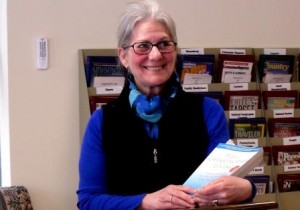
CLEARFIELD – The AAUW Books-Sandwiched-In 2015 series began with a presentation by Barbara Schmaus on the nonfiction book titled Full Catastrophe Living: Using the Wisdom of Your Body and Mind to Face Stress, Pain and Illness by Jon Kabat-Zinn.
She felt this book has a life-changing potential for readers. It is designed to give instruction on how to follow the eight-week mindfulness-based stress reduction program developed by the author and practiced worldwide.
Commenting on the attention grabbing title of the book, Schmaus revealed that it was taken from the film version of the novel Zorba the Greek when the main character refers to the ups and downs of everyday life as “the full catastrophe.”
She said that the author maintains that people can best deal with the stress of everyday living by being mindful. In a mindful state, “you simply notice what’s going on – your breathing, your body, your thoughts, your feelings, anything, really – without analyzing or judging or reacting to it.”
Schmaus engaged the audience with a breathing exercise described in the book. The idea was for each person to focus solely on his/her breathing, putting aside such random thoughts as what was needed at the grocery store.
She coached the group through the three-minute exercise, quietly reminding to refocus without judging when other thoughts intruded. As Schmaus noted, it wasn’t as easy as one might think. In order to be mindful, she said it requires practice.
Referring to the book’s table of contents, Schmaus pointed out that the book is divided into five parts. Part one deals with the practice of mindfulness, which provides the framework for reducing stress. The reader learns that mindfulness requires that seven attitudes should be consciously cultivated while practicing: non-judging, patience, a beginner’s mind, trust, non-striving, acceptance and letting go.
In these pages the author uses the experiences of real people. These personal accounts make the book read almost like a novel in places, Schmaus remarked.
Part two of the book is entitled “The Paradigm: A New Way of Thinking about Health and Illness.” This section talks of integrative and participatory medicine that emphasizes the importance of thinking in terms of the whole body, mind and behaviors in treating illness and being aware of how things are interconnected.
To illustrate the automatic nature of the patterns of seeing and thinking, Schmaus had the audience refer back to a puzzle she had placed on the tables prior to lunch. It was called “the problem of the nine dots.”
The idea was to connect the nine dots, which were arranged in three rows of three using only four lines and never lifting one’s pen or pencil from the paper. Only a few of the participants were able to solve the puzzle, which required forgetting about preconceptions and thinking outside the box.
Part three dealt with stress, indicating the many different kinds of stress and the physical effects of stress on bodies. Again the author uses examples of real people and clinical research studies to illustrate what stress can do.
Schmaus commented that part four contains something for everyone. This section called “The Applications: Taking on the Full Catastrophe” conveys to the reader how to work with symptoms, physical and emotional pain, fear, panic and anxiety. The various types of stress, which confront people every day are explored.
Part five, “The Way of Awareness,” highlights personal growth experienced by participants in the clinic. An abridged schedule of the eight-week program is included, as well as additional hints and suggestions to continue staying mindful. Schmaus shared that this last section reminds people that the practice of mindfulness does not rid of pain, illness or stress but rather has the potential to reduce suffering.
Schmaus concluded her review of Full Catastrophe Living by categorizing the book as an informative and entertaining read. She encouraged the listeners to try this book, which she described as one which could be profoundly useful to all.
The book Full Catastrophe Living is available for checkout or hold at Shaw Public Library, as well as Mindfulness for Beginners: Reclaiming the Present Moment and Your Life also written by Jon Kabat-Zinn.
The review concluded with Gwen Crandell, AAUW member, commending Schmaus on her presentation and thanking her for her participation. Crandell also thanked the audience for their attendance and informed them that the proceeds from Books-Sandwiched-In go to the group’s Interrupted Studies Scholarship.
Crandell reminded everyone of the three remaining Books-Sandwiched-In events. On March 11 at 12 p.m., Gayle Gearhart will review the book Paris: The Novel. In an evening program at the library March 18 at 7 p.m., Denny Shaffner will review John Bard’s History of the Old Bucktails. The final review by Liz Stumpf of the novel, All the Light We Can See, will be presented March 25 at 12 p.m.
Reservations for the next AAUW Books-Sandwiched-In program may be placed by visiting the front desk of Shaw Public Library or by calling 814-765-3271 prior to March 9 at 5 p.m. You may sign up for all the remaining programs at that time, as well.
The library is open Mondays, Wednesdays, and Saturdays from 10 a.m. until 5 p.m., Tuesdays and Thursdays from 10 a.m. until 9 p.m. and Fridays from 12 p.m. until 5 p.m. Additional information may also be found on Shaw Public Library’s Web site at http://www.clearfield.org/shaw.